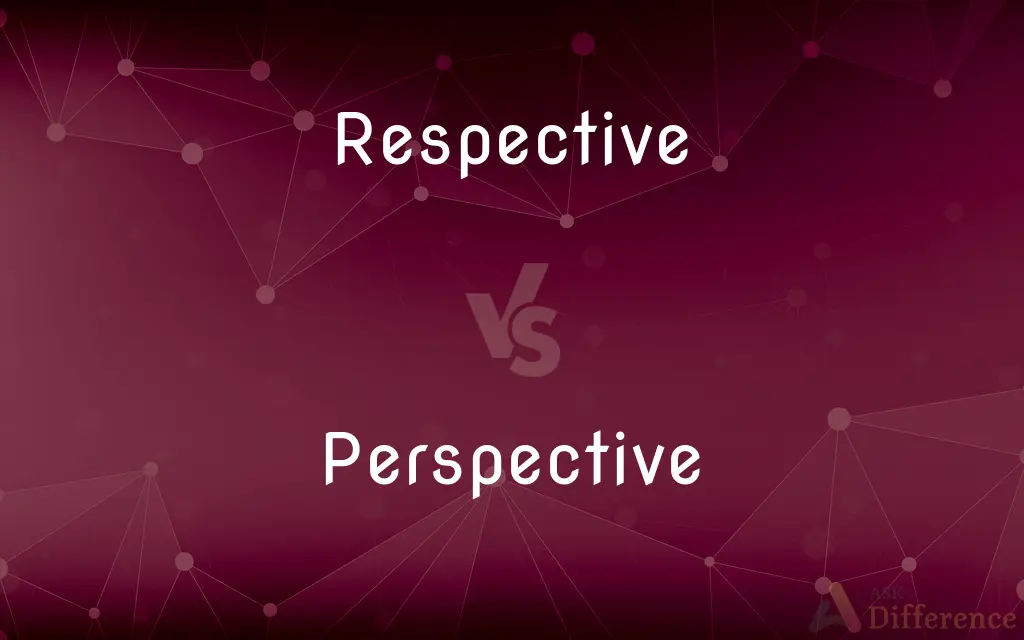Respective vs. Perspective — What's the Difference?
By Maham Liaqat & Urooj Arif — Updated on February 23, 2024
Respective refers to relating to particular individuals or things separately, while perspective is a viewpoint or way of considering something.

Difference Between Respective and Perspective
Table of Contents
ADVERTISEMENT
Key Differences
Respective is an adjective used to describe something that belongs individually to each of several people or things. For example, in a group project, each member may have their respective tasks, indicating that the tasks are distributed and specific to each person. On the other hand, perspective is a noun that refers to a particular attitude towards or a way of regarding something; it is a mental viewpoint or standpoint. This term is often used to discuss how different people see or interpret an event or concept.
Respective emphasizes the individual aspect of components within a collective group, highlighting the separate and distinct roles or characteristics assigned to each. It underlines the differentiation within a group. In contrast, perspective focuses on the angle or approach from which something is viewed or considered, which can vary greatly from person to person based on their experiences, beliefs, and emotions.
The use of respective ensures clarity in communication by specifying that each item or person is linked to its own unique element or role. This specificity is crucial in contexts where individual contributions or attributes are being discussed. Perspective, however, enriches the conversation by introducing the concept of diversity in thought and observation, allowing for a broader understanding of a situation or concept.
Respective deals with the external distribution of roles or items, while perspective delves into the internal realm of understanding and interpretation. This distinction is vital in discussions where both the organizational and perceptual aspects of a subject are considered.
Respective is about the allocation or association of elements to individuals within a group, ensuring clarity and order. Perspective, however, is concerned with the interpretation and conceptualization of ideas, offering insight into how things are perceived or understood from different viewpoints.
ADVERTISEMENT
Comparison Chart
Part of Speech
Adjective
Noun
Definition
Relating individually to each of several persons or things
A particular attitude toward or way of regarding something
Focus
Individual elements within a group
Viewpoint or interpretation
Usage Context
Allocation or association to individuals
Understanding or conceptualizing ideas
Example in Sentence
Each team member completed their respective assignments.
From an environmentalist's perspective,this policy could be detrimental.
Compare with Definitions
Respective
Pertaining individually to each of several people or things.
The students turned in their respective essays on time.
Perspective
A particular attitude towards or way of regarding something.
From a historical perspective, the event was pivotal.
Respective
Related to specific items or persons in a group.
They went to their respective homes after the movie.
Perspective
A mental viewpoint on a topic or issue.
Her perspective on the matter was influenced by her upbringing.
Respective
Denoting personal ownership or relation.
Each member has their respective responsibilities in the project.
Perspective
The art of representing three-dimensional objects on a two-dimensional surface.
The painting's perspective gave the illusion of depth.
Respective
Indicating separate and distinct roles.
The artists showcased their respective talents at the exhibition.
Perspective
The capacity to view things in their true relations or relative importance.
Traveling abroad broadened his perspective on culture.
Respective
Signifying individual allocation.
The siblings inherited their respective shares of the estate.
Perspective
A specific standpoint or position.
The documentary offered a unique perspective on urban life.
Respective
Relating to two or more persons or things regarded individually; particular
Successful in their respective fields.
Perspective
A particular attitude towards or way of regarding something; a point of view
Most guidebook history is written from the editor's perspective
Respective
Relating to particular persons or things, each to each; particular; own.
They returned to their respective places of abode.
Perspective
The appearance of things relative to one another as determined by their distance from the viewer
Respective
(obsolete) Looking toward; having reference to; relative, not absolute.
The respective connections of society
Perspective
The ability to consider things in such relative perspective.
Respective
Relating to particular persons or things, each to each; particular; own; as, they returned to their respective places of abode.
Perspective
Pertaining to the art, or in accordance with the laws, of perspective.
Respective
Considered individually;
The respective club members
Specialists in their several fields
The various reports all agreed
Perspective
The art and the science of so delineating objects that they shall seem to grow smaller as they recede from the eye; - called also linear perspective.
Common Curiosities
What does it mean by respective duties?
Respective duties refer to the specific and individual responsibilities assigned to each person in a group.
How do you use respective in a sentence?
You can use respective in a sentence to indicate that something belongs or relates to each person mentioned, e.g., "They returned to their respective offices."
Can perspective be subjective?
Yes, perspective is often subjective as it is influenced by an individual's experiences, beliefs, and emotions.
Can a group have a collective perspective?
Yes, a group can share a collective perspective if its members have common experiences or beliefs influencing their viewpoint.
Can perspectives change?
Yes, perspectives can change with new experiences, information, or shifts in belief systems.
Is respective used for objects or just people?
Respective can be used for both people and objects, indicating individual association or relation in a group context.
Is perspective always about visual perception?
No, perspective can refer to visual perception in art, but it also broadly applies to attitudes, viewpoints, or ways of understanding something.
How does respective ensure clarity?
Respective ensures clarity by specifying that each element or item is individually associated with a person or thing, reducing confusion.
Why is perspective important in art?
Perspective is crucial in art for creating depth and realism, allowing artists to represent three-dimensional scenes on two-dimensional surfaces.
Can respective be used without specifying a group?
Respective is typically used in reference to a previously mentioned or understood group of people or things.
How does perspective affect decision-making?
Perspective affects decision-making by influencing how information is interpreted and which aspects are considered most important.
How do different perspectives contribute to understanding?
Different perspectives contribute to a broader and more nuanced understanding of issues by incorporating diverse viewpoints.
How can one broaden their perspective?
One can broaden their perspective by exposing themselves to new experiences, cultures, ideas, and engaging in open-minded discussions.
Can one's perspective be wrong?
While perspectives can be subjective, they can be based on misinformation or biases, leading to misunderstandings or incorrect assumptions.
Is there a difference between perspective and opinion?
Yes, perspective is a broader way of viewing things that informs opinions, which are more specific judgments or beliefs.
Share Your Discovery

Previous Comparison
Ground vs. Soil
Next Comparison
Shorty vs. ShortieAuthor Spotlight
Written by
Maham LiaqatCo-written by
Urooj ArifUrooj is a skilled content writer at Ask Difference, known for her exceptional ability to simplify complex topics into engaging and informative content. With a passion for research and a flair for clear, concise writing, she consistently delivers articles that resonate with our diverse audience.















































